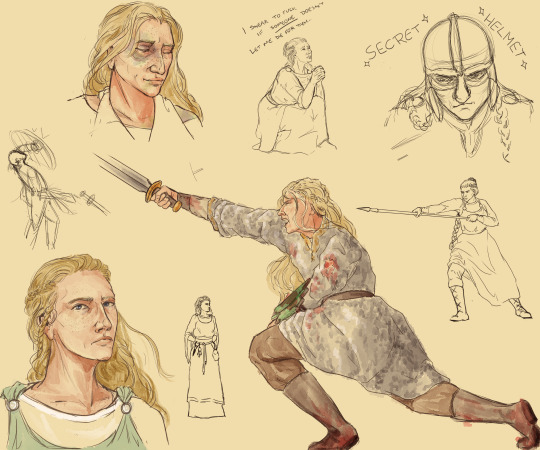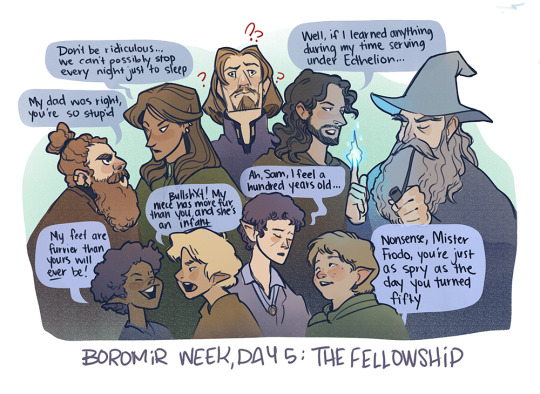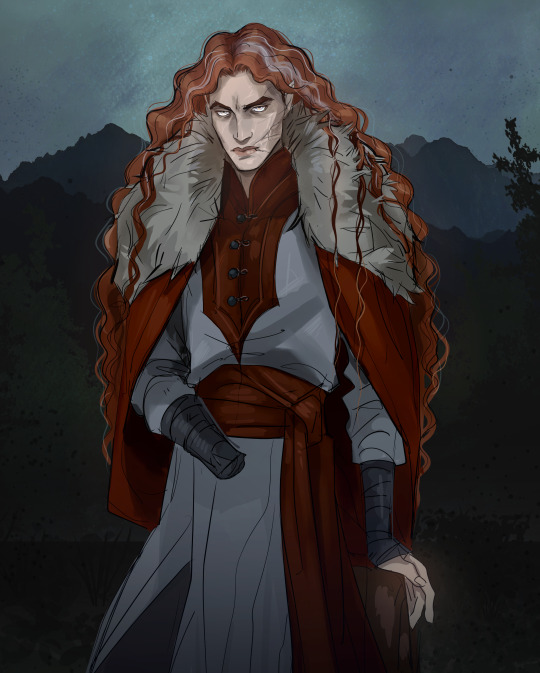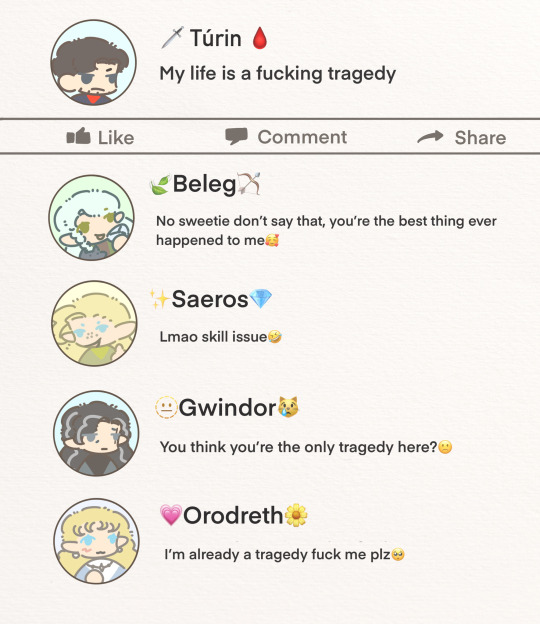Text
Baby queen Elwing, ruler of a displaced people who have never had a child monarch before and aren’t super clear on the procedures. They only just adjusted to peredhil rulers! Now a two year old peredhil; how is she going to adjudicate disputes?
They do eventually figure out a system of elected temporary regents; Oropher for a while before he leaves, a well known marchwarden or two. The local humans advise them on what a good age of majority is. But because this is a magical, part-divine toddler queen tasked with carrying a holy relic, she also gets asked her opinion on policy more than might be sensible.
Five year old Elwing very seriously imparting the advice that they should build their refugee houses with rocks instead of sticks because she has heard fairy tales about that. Seven year old Elwing on her rounds to bless the boats before fishing season. You get called into court by your neighbor who lives in Sirion territory and there’s a glowing ten year old on a throne just kind of observing events. After half an hour she gets bored and leaves the room to play but her image remains seared into your retinas.
159 notes
·
View notes
Text
thinking about the parallels between théoden and denethor, and i have a LOT of thoughts about them. about how they are the same and how they differ, and why this reflects the redemption of one and the final destruction of the other. and how that reflects the wider themes of the story. and why i feel it is deeply unfair to accuse théoden of being a bad parent on a remotely comparable level to denethor. and duty and power and love and and and
but i think the biggest thing for me is. swords.
both characters' arcs are explicitly connected to their relationships with swords, but in opposite ways.
théoden's is unarmed for the majority of his illness/corruption. his redemption is symbolised by him standing and calling for his sword. his sword has been lacking from him in the depth of his corruption, and he has accordingly separated himself from the responsibility it represents. he ceases to be warrior or king or father, and becomes an invalid; and when he is cured he can have his sword back.
denethor, on the other hand, carries a sword constantly. he dresses in mail he will not use with a weapon he will not raise, explicitly to show his readiness for an attack that he absolutely proves he is not ready for. he adopts the appearance of duty without its meaning. he thinks he is a warrior, a king, and a father because he performs the actions of those roles, but he does so without understanding them or having the motivating force behind them. he cannot be redeemed because he thinks he already has been, that he has no need to restore anything because he is already everything he should be.
compare and contrast their children's lines: éowyn's "those without swords can still die upon them" and faramir's "i do not love the sword for its brightness [...] i love only that which [it] defends." these lines, and the relationships between the child and the father(-figure), are microcosms of the relationship between people and lord.
éowyn, who is kept from taking up the sword - who wants to take up the sword, to assert agency and because she understands that the war is coming whether she is in it or not - understands that théoden is not protecting anyone by denying the presence of the threat. under wormtongue's influence, théoden denies that there is a threat, believes that anyone sounding the alarm is doing so maliciously and that the best thing to do is to maintain the status quo, close the doors, and avoid the inevitable. his redemption is in taking up the sword - and as king, as the representative of rohan, the whole of rohan takes up the sword when he does - and meeting the truth. those without swords can still die upon them.
théoden does not, in my estimation, prevent éowyn from taking up arms because he disregards her, underestimates her, or doesn't care about her. i would argue that both he and éomer want her to remain out of it because they love her - because they want to protect her, but fail to recognise as she does that it is not protecting her to remove her agency and ability to contribute actively to the war. the war must be fought, and won, for her as much as for anyone: éowyn's arc, rohan's arc, and théoden's arc is all in "those without swords can still die upon them." you cannot protect people by refusing to acknowledge the threat, no matter how lovingly it is done: you have to let them take up the sword.
faramir, on the other hand, is faced with the exact counterpoint of that. denethor is not trying to protect anyone. denethor is entirely about political image: his own self-image, and how others perceive him. denethor knows that there is an existential threat, and where he denies anything, it's the hope of peace or victory. but he is also entirely concerned with the act of defence. he will continue to throw troops into the meat-grinder while still holding out, inherently, for his own heroism and the belief that only he can save Gondor, that the deaths of thousands are just a way to buy time for his personal psychic battle with sauron. the palantír is not what corrupts him, it is the tool that justifies his corruption. denethor does not value the running of his city or his country, he will not help rohan or call rohan for help without outside intervention, he demands to be the main character of this war. in the end, he is prepared to desecrate everything that gondor holds dear - the tombs of the stewards, the continuation of his line, the idea of the king - and to abandon his defence of the walls to follow his own grief and anger. because it was never about defence. it was about being sharp and pragmatic and cold and steely. he never cared about people, because the people in his life have only ever been tools to him.
and so he ignores the advice of his people - in this case represented by faramir and imrahil - and the knowledge that he is throwing lives away for no real tactical advantage. he sends faramir out, and faramir goes - not because faramir believes it, or because faramir is spineless, but because everyone is aware that if faramir doesn't go then someone else will - and everything goes terribly wrong. and now denethor decides that he should spare some lives, and not let imrahil lead a sortie outside the walls to rescue them. why? because it doesn't matter to him. it matters to him only when he realises that losing faramir means that he has lost his legacy. and he is now ready to despair, because there is no more battle, there is no more mind war with sauron, there is no more sword to raise, there is only "that which they defend". and denethor doesn't give a shit about what he's defending. he cares about the idea of defending. in the end, he abandons his sword in favour of a knife and a torch - tools without glory - because the sword without the values behind it is meaningless.
and that's why théoden can be redeemed, and denethor can't. because théoden maintains the driving principles, but loses the strength. denethor has the strength, but he has never truly had the principle. and principle without strength is weakness, but strength without principle is death.
ALSO DENETHOR IS A 1:1 SYMBOLIC REPRESENTATION OF BUTCHER OF THE SOMME FIELD COMMANDER SIR DOUGLAS HAIG IN THIS ESSAY I WILL....
#movie Denethor lives rent free in everyone’s minds even when they’re reading the book#nope Denethor is not as bad and Theoden is not as good as they are in the films#also it’s kinda funny to me that Tolkien’s pro monarchy propaganda has been so smashingly successful#oh and the battle at Osgiliath buys time for the Rohirrim to arrive. Sounds useful to me.#Denethor isn’t a glory hound although he is a control freak#the armor and sword are hidden under his robes most of the time#sleeping in armor feels more like an act of asceticism and solidarity with the troops than vanity ffs#also does anyone know what Faramir’s commitment to honor and gentleness actually imply?#Faramir is willing to LET THOUSANDS OF PEOPLE DIE rather than use the Ring#Denethor is the one who is scandalized by Faramir’s willingness to let innocent people die#yeah I know that no one can use the Ring safely but it’s the principle of the thing#both Boromir and Denethor want to use the Ring to save lives#not for their own glory
35 notes
·
View notes
Text
i enjoy thinking about the silmarillion as an in-universe historical text and also building on that it's really fun to think about what other texts (not necessarily limited to writing) might have survived in-universe from the first age or even before. of course a lot of it got destroyed, but as in the real world, there would be copies of copies and fragments and things written down from memory and stories told to children that survived. Even if 95 percent of everything was lost, that still leaves a whole lot! and all of that would be subject to further translation and mythologization and fragmentation and alteration after the first age. there's so much potential in the cultural legacy (& its reception) of first age beleriand
201 notes
·
View notes
Text

no i am never not thinking about éowyn. my wife my love my queen my absolute mess of a person.
and i am never not thinking about the name dernhelm and the very funny choice, when asked who she is, to be like "if you're really this dumb just call me HIDDEN PROTECTOR. call me MYSTERIOUS HAT. call me SECRET HELMET you idiot hobbit."
17 notes
·
View notes
Text
Boromir Week, Day 7: Freeform
You know what? Screw it. Boromir and Aragorn as tired dirtbag summer camp counselors in 1978

Obligatory DIY ear piercing. Arwen joins in. It gets infected.

An ode to the nights I spent sleeping on a cabin roof with my fellow counselors in the backcountry of New Mexico in the aughts. Boromir's shirt says "I Survived Amon Hen," it's from Capture the Flag

@boromir-week
446 notes
·
View notes
Text

Arwen (Anishinaabe), most gorgeous girl in the whole wide world <3
Elrond is reading them Black Beauty bc they're both horse girls.
178 notes
·
View notes
Text
Tolkien: The sun is great
Tolkien: But you know what would make it even better?
Tolkien: If it were a tree.
929 notes
·
View notes
Text
Faramir calling Galadriel “the Mistress of Magic” and talking about how it’s better to keep a wary distance from that kind of weird Elvish stuff is 10x funnier when you consider that Galadriel’s most distinctive native ability is her insight into the thoughts and hearts of others.
230 notes
·
View notes
Photo

just gals being pals B)
1K notes
·
View notes
Text

refugee fam beach day feat. elwing and elros :)
949 notes
·
View notes
Text


Art fight relaxed their rule on submitting fan AU designs of copyrighted/canon characters this year. i am punishing them for it
I focused in on the most nonsensical things i do with this character in an attempt to prove as strongly as I could that this is suitably AU to fit within the terms of service. if I am mistaken about that someone is going to have to take the step of reporting me for posting cringe ¯\_(ツ)_/¯
#lotr#gollum#idk why it surprised me to learn that Tolkien said Gollum wore clothes#I like the way this humanizes him#it makes more sense than having him naked except for a loincloth#also recovering Gollum with a cute haircut 🥺
157 notes
·
View notes
Photo

Has this been done?
The movie characters became so iconic it’s weird to try and redesign them, but here we are.
2K notes
·
View notes
Text
Boromir Week, Day 5: The People's Prince, the Fellowship
"I will not go," said Boromir, "not unless the vote of the whole company is against me. What do Legolas and the little folk say? The Ring-bearer's voice surely should be heard?" "I do not wish to go to Moria," said Legolas. -The Fellowship of the Ring

When I center Boromir in narratives, I often cast Legolas as the comic relief, but actually, I've always thought of him in much the same way as Boromir: the son of a lesser ruler who has spent his entire adult life fighting the supernatural threat to his home, aided by no magic, largely unremarkable except in his bravery, skill, and dedication to his people. Another people's prince. Until Elladan and Elrohir decide to show up later in the series, Legolas is the only Elf who sees fit to put his life aside to help the Fellowship. I've always liked him for that, and I think amid all Boromir's weirdling companions in the Fellowship, he would clock Legolas as a kindred spirit---someone who knows strategy, someone who knows how to rely on his own wits and strength rather than mystical solutions. It's the combined masterminding of Boromir and Legolas who get the Fellowship off Caradhras, and in Moria I think they'd see themselves in similar roles. Gandalf seems to be at a loss. Aragorn hasn't had to step up yet. Gimli's expectations of the reception in the mines was wildly different to the grim reality. So I think Boromir would assume that if anybody was going to get them out of the mess they're in, it's him and the guy who can run over the snow, even if he does pass entire nights staring straight at the moon like a little freak.
But mostly, I think Boromir's time amid the Fellowship is mostly just

Like being the only human actor in a muppet movie
@boromir-week
765 notes
·
View notes
Note
can you draw maedhros? 🥺

Maedhros my beloved shakespearean hero :')
589 notes
·
View notes
Text
Boromir Week Day 1: Brother of Faramir, Childhood (again)

something a bit haphazardly quick (and not exactly right with age difference between the two, but we’re ignoring that for a second).
I really like the headcanons that Finduilas loved the ocean and bringing her boys to it, so I’d like to think that after she dies Boromir takes it upon himself to go visit her at the beach every once in a while. It’s a familiar place for them and makes them feel just a bit closer to their mother despite the little amount of time Faramir really knew her for.
@boromir-week
102 notes
·
View notes
Note
I love your world building! Your name ideas are awesome. Love the idea of Indis being a true prophetic mother name
-@outofangband
Belated thank you! Also, sharing my thought process on that one because it's a very classic Silmarillion headcanon origin: it bothers me that Indis's name means "bride." I hate how it reduces her to a feminine trope - at "best", only here to have a troubled marriage; if you're a staunch Fëanorian, a femme fatale homewrecker. I immensely dislike how this is, in fact, an fairly accurate description of her role in the story...
Which is deliberate on Tolkien's part! The "canonically correct" way to ameliorate this misogyny (though neither erase nor excuse it) is to remember that this whole text is a mixture of history, legend and myth passed through multiple storytellers over thousands of years, translated and re-translated and interpreted through the eyes of elves and men and hobbits and men again, until even if this person ever actually existed in the history of Middle Earth - IF! - "Indis" probably wasn't even her epessë, much less her commonly used name. Probably her name got ink blotted on it at some point, or mixed up with someone else's name, and the next Númenorean scholar to rewrite the text followed the Archetypal School of historical interpretation and decided to name her "Indis" because of her role in the story...
But this, too, bothers me. Because I love the framing device of these various books, I love the historian-given dubious canonicity of literally every detail of The Hobbit, Lord of the Rings, and especially of The Silmarillion. But! We need some solid canon upon which to hang all our headcanons, so it's imperative to retain a delicate mental balance of knowing everything could be made up (more than it already is by being fiction!) while also adhering to as much as possible as something that Really Did Happen - and names are pretty solidly in the latter category. I mean, everyone has multiple and for those who don't, we tend to make more up, but a belief in the basic premise of the text is necessary in order to function in any fandom, and "names of characters" is pretty "basic premise."
So it's impossible to ignore that her name is Indis; and it's impossible to ignore that the name "Indis" is closely connected to her place in the narrative, more than most characters, and that said place is uncomfortably non-feminist - you can round out her character all you like, but you have to admit that her role in the story is to be the Second Wife and Mother whose acts of being a wife and mother cause trouble! That's a fact! And it's not great! And the name "Indis" isn't helping because if she was named anything but her literal narrative role, that would be characterization! She could be noble like Artanis, she could be of the sea like Eärwen, but she's not! She's just "bride"!
...so, I redeem this by making this definition of her life deliberate within the text - and not just by a future Númenorean scholar, but by Indis's mother. (Female! O! Cs!) Furthermore, names of prophecy are implicitly grand (even if they're not necessarily either good or bad). It makes being a bride itself feel more active - and why not! Do Indis's acts of love and marriage not change the fate of the world just as much as Lúthien's? Consider that Indis's act of marriage is so important that it echoes back through the Great Music to be known by her mother as she held the future bride as a babe in arms. Consider a mother holding her child under stars beside a lake and going, "damn, this kid is gonna have ripple effects. I should add a bragging warning label."
Also, if you accept the headcanons that
a) most Elvish languages treat "sex" (physical) and "marriage" (soul-bonding) as basically synonymous; and
b) Indis spends thousands of years in the Second/Third ages patiently and stubbornly figuring out how to Make It Work between herself, Finwë and Miriel, such that all three of them can marry with genuine all-around mutual love unto the end of days, for peace among the still-troubled Noldor but mostly for happiness for herself and those she loves most (also an act of bride-ship worthy of prophecy, note) -
then you can with a straight face imagine Indis saying, "I fucked my way into this mess and I'm going to fuck my way out of it."
Feminist critique + consideration of canonical historicity + elaborate headcanon web = sex joke! Now that's good fandom!
202 notes
·
View notes
